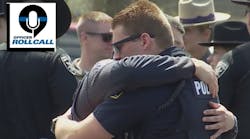A Miami police officer whose shooting of an unarmed motorist two years ago capped a string of fatal police encounters that sparked a public outcry and political upheaval was fired on Wednesday.
The reason: a review board finding that officer Reynaldo Goyos used "unjustified" deadly force when he shot and killed Travis McNeil and wounded friend Kareem Williams as they sat in car at a Little Haiti intersection.
The decision -- coming seven months after the Miami-Dade state attorney's office declined to prosecute after determining the shooting had not reached the level of criminal intent -- didn't offer much solace to the victim's family. At the McNeil home in Overtown, the mood was subdued and somber.
"It doesn't help my son a whole lot," said McNeil's mother, Sheila McNeil. "Nothing will bring Travis back."
Across town, Fraternal Order of Police President Javier Ortiz blasted a decision that he vowed would not stick. The union intends to appeal.
Ortiz said Goyos, a seven-year veteran taking part in a multiagency undercover gang task force, had been put into harm's way by a federal agent driving the vehicle carrying both of them. He also blamed McNeil for his own death, claiming he didn't follow the officer's command.
"There is no doubt that Officer Goyos will get his job back," said Ortiz.
Chief Manuel Orosa formally announced the firing on Wednesday, nearly two months after the police department's Firearms Review Board concluded the shooting was unjustified.
In a short, seven-paragraph opinion released for the first time, the board found that the evidence surrounding the shooting was "inconsistent with Officer Goyos statement." The report said McNeil had been struck in the rear left shoulder blade area, which didn't match with Goyos' description that he had approached the car from the passenger side and had seen "a black object on Mr. McNeil."
The review board found the shooting was in violation of the department's deadly force policy because neither Goyos nor anyone else "was in imminent danger of death or serious physical injury" when the officer opened fire.
The review board also ruled that the officer "should have never approached the vehicle, but instead should have retreated and followed all training protocols regarding felony stops involving armed subjects or vehicles."
Orosa refused comment pending the appeals process. According to union chief Ortiz, an arbitrator will review the firing and issue a binding decision.
The review board is composed of ranking officers and staff who review every police-involved shooting. As far as anyone could remember Wednesday, the board had never ruled an officer-involved shooting unjustified.
The shooting occurred on a Thursday night in February 2011. Goyos, joined by officers from Hialeah and the U.S. Bureau of Alcohol Tobacco and Firearms and the U.S. Department of Homeland Security Investigations, were targeting gang members, some who they believed spent time at a notorious Little River establishment called the Take One Cocktail Lounge on Northeast 79th Street. An hour before midnight McNeil, 28, and Williams, 32, were kicked out of the lounge for being drunk and drove off, but not before an officer in the parking lot radioed other officers that the men were leaving.
By the time McNeil's Kia Sorrento had reached the intersection of Northeast 75th Street and North Miami Avenue, three unmarked vehicles with flashing lights had blocked off his path. That's when, the city's review board found, Goyos approached McNeil's car on the passenger side, warning, "Don't do it."
Goyos opened fire, striking Williams twice, and McNeil once in the back near his left shoulder. The bullet killed him. The only dark objects found in the car were cellphones.
The McNeil shooting was the seventh fatal shooting of young black men by Miami police officers in just eight months, a string of violence that raised tensions in inner city neighborhoods and caused a political backlash at City Hall that would ultimately cost then-Chief Miguel Exposito his job.
The other men shot and killed by police were Joell Lee Johnson, Tarnorris Tyrell Gaye, Gibson Junior Belizaire, Brandon Foster, and Lynn Weatherspoon. Weapons were found on five of the men.
In November 2011, nine months after the last shooting, the U.S. Justice Department, at the urging of local civil rights groups and U.S. Rep. Frederica Wilson, announced it would review the shootings and department policies. That investigation is still ongoing. The state attorney's office also investigated the shootings but concluded none of the officers had committed a crime.
The Goyos firing adds to turmoil at the department. After a relatively calm year, the police department has been rocked by scandal and corruption in recent weeks.
Internal Affairs detectives are working with the FBI in an ongoing probe of up to 10 officers suspected of providing protection to a Liberty City gambling ring. One of those officers was arrested last week on an extortion charge. Earlier this month, a former narcotics detective was convicted of eight felonies, including obstruction of justice and taking drugs and money from suspects. A second detective also pleaded guilty to misdemeanor drug charges stemming from the same investigation, and later testified against his partner, as did four detectives who worked on his team.
The string of embarrassments continued Wednesday with the arrest of a Miami police office who prosecutors charged with sexually assaulting a female suspect in his squad car.
Pastor Anthony Tate of the New Resurrection Community Church, who comforted Sheila McNeil for months after the shooting, called the Goyos firing "good news."
"It gives a new perspective on the city of Miami that they're now policing their own," Tate said. "It shows there is discipline and concern."
For Sheila McNeil, at home surrounded by family, the past two years have been "blurry." She said she has noticed an easing of tensions in her own neighborhood since Orosa replaced Exposito.
Still, two years after her son's death, smiling is difficult, she said.
"Not a day goes by when I don't think of Travis," McNeil said. "My grandson is a constant reminder, he just turned 12. For a while I just wanted some justice, but at the end of the day, nothing is going to bring him back."
Copyright 2013 - The Miami Herald
McClatchy-Tribune News Service


